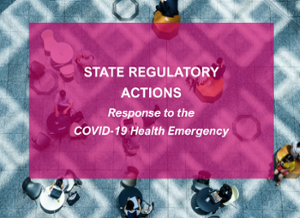Today's Regulatory Mix: FTC Warns Service Providers Against "Assisting and Facilitating" Illegal Coronavirus-Related Telemarketing Calls, FCC Announces New COVID-19 Telehealth Program , FCC Home Network Tips for the Coronavirus Pandemic, FCC Supports Tribal Connectivity in New Mexico
 FTC Warns Service Providers Against ‘Assisting and Facilitating’ Illegal Coronavirus-Related Telemarketing Calls
FTC Warns Service Providers Against ‘Assisting and Facilitating’ Illegal Coronavirus-Related Telemarketing Calls
In a press release, the FTC announced its staff sent letters to nine Voice over Internet Protocol (VoIP) service providers and other companies warning them that “assisting and facilitating” illegal telemarketing or robocalls related to the coronavirus or COVID-19 pandemic is against the law.
“It’s never good business for VoIP providers and others to help telemarketers make illegal robocalls that scam people,” said FTC Bureau of Consumer Protection Director Andrew Smith. “But it’s especially bad when your company is helping telemarketers exploiting fears about the coronavirus to spread disinformation and perpetrate scams.”
The staff sent the letters to the following companies: 1) VoIPMax; 2) SipJoin Holding, Corp.; 3) iFly Communications; 4) Third Rock Telecom; 5) Bluetone Communications, LLC; 6) VoIP Terminator, Inc., also known as BLMarketing; 7) J2 Web Services, Inc.; 8) VoxBone US LLC; and 9) Comet Media, Inc.
They stress that combatting illegal telemarketing is a top priority of the Commission, with a special emphasis on stopping illegal robocalls. Staff’s letters cite two cases the FTC has brought in this area, one against James B. Christiano whose companies provided software to robocallers, and another against a VoIP service provider called Globex Telecom.
 FCC Announces New COVID-19 Telehealth Program
FCC Announces New COVID-19 Telehealth Program
FCC Chairman Ajit Pai announced he was circulating a plan for a COVID-19 Telehealth Program to support health care providers responding to the ongoing coronavirus pandemic. As part of the CARES Act, Congress appropriated $200 million to the FCC to support health care providers’ use of telehealth services in combating the COVID-19 pandemic. If adopted by the FCC, the Program would help eligible health care providers purchase telecommunications services, broadband connectivity, and devices necessary for providing telehealth services. In order to receive funding, eligible health care providers would submit a streamlined application to the FCC. The FCC would award funds to selected applicants on a rolling basis until the funds are exhausted or until the current pandemic has ended. These services would directly help COVID-19 patients and provide care to patients with other conditions who might risk contracting the coronavirus when visiting a healthcare provider—while reducing practitioners’ potential exposure to the virus.
The Chairman also presented his colleagues with final rules to stand up a broader, longer term Connected Care Pilot Program. It would study how connected care could be a permanent part of the Universal Service Fund by making available up to $100 million of universal service support over three years to help defray eligible health care providers’ costs of providing telehealth services to patients at their homes or mobile locations, with an emphasis on providing those services to low-income Americans and veterans. This program is separate from the COVID-19 program. It would provide funding for selected pilot projects to cover 85% of the eligible costs of broadband connectivity, network equipment, and information services necessary to provide connected care services to the intended patient population. In order to participate, eligible health care providers would submit an application to the FCC, which would then announce the selected pilot projects.
 FCC Home Network Tips for the Coronavirus Pandemic
FCC Home Network Tips for the Coronavirus Pandemic
The FCC released a consumer guide entitled “Home Network Tips for the Coronavirus Pandemic.” The tips include areas such as: checking your internet plan to see the speeds you subscribe to; testing your broadband speed by downloading a speed test app and contacting your ISP if necessary to see if they offer troubleshooting tips; checking your in-home connectivity on your wireless router; creating an internet schedule for family users; and exploring other options such as using your mobile phone as a hot spot if your cellular signal is strong or considering fixed wireless or other cellular alternatives.
 FCC Supports Tribal Connectivity in New Mexico
FCC Supports Tribal Connectivity in New Mexico
The FCC’s Wireless Telecommunications Bureau granted an emergency Special Temporary Authority request filed by A:shiwi College & Career Readiness Center to use unassigned 2.5 GHz spectrum to provide wireless broadband service over the reservation of the Pueblo of Zuni in New Mexico in light of increased demand due to the COVID-19 pandemic. In addition to supporting emergency relief to meet increased broadband demands during the pandemic, the FCC continues to accept priority applications from eligible Tribal entities for licensed access to unassigned 2.5 GHz spectrum over their rural Tribal Lands in the Rural Tribal Window, which closes August 3, 2020. The grant of emergency temporary access to 2.5 GHz spectrum will not affect the availability of such spectrum to eligible Tribal applicants in the Rural Tribal Window.
____________________________
The Regulatory Mix, Inteserra’s blog of telecom related regulatory activities, is a snapshot of PUC, FCC, legislative, and occasionally court issues that our regulatory monitoring team uncovers each day. Depending on their significance, some items may be the subject of an Inteserra Briefing.




